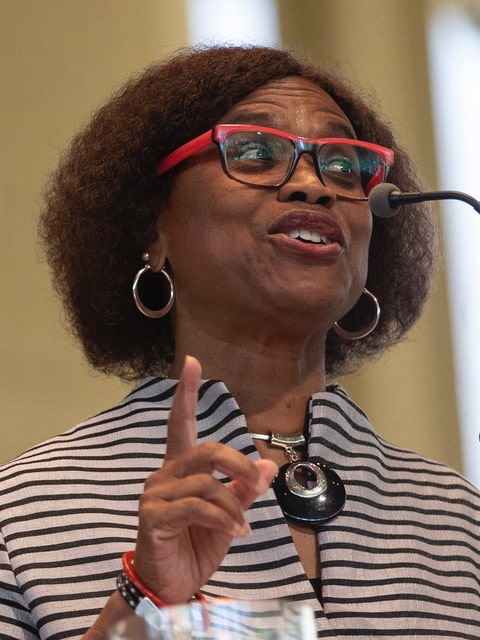In the pantheon of slain Americans who have furthered civil rights gains of a marginalized group, Rita Hester, an African-American transgender woman, is among them. There had been several transgender murders prior to Rita’s — including that of Chanelle Pickett in Watertown, Mass., in 1995, and Monique Thomas in Dorchester, Mass., in September 1998. Rita lived large and loved big, but she could have never imagined her life and her death would mean so much to so many.
On November 28, 1998, Rita was found dead in her first-floor Boston apartment with 20 stab wounds to her chest, just two days before her 35th birthday. Her murder sparked the “Remembering Our Dead” web project that became the catalyst for the annual International Transgender Day of Remembrance on November 20.
Her murder occurred six weeks after Matthew Shepard’s in Laramie, Wyo., which became an internationally known homophobic hate crime. In 2009, President Barack Obama signed into law The Matthew Shepard and James Byrd Hate Crimes Prevention Act.
In 2022 Rita’s murder remains an unsolved cold case, as are most transgender murders. Her murder occurred in an era when the “trans panic” defense — a defendant melodramatically pleads temporary insanity for a killing — was a legal strategy. Friends of Rita told NBC.com their suspicion about her murder: “A man (or men) who couldn’t face his attraction to a trans woman came home with Hester and killed her in a fit of shame.”
I’ll never forget Rita’s vigil because the words of Rita’s mother, Kathleen Hester, haunt me to this day. When she came up to the microphone during the Speak Out portion of the vigil at the Model Cafe, where Rita was well-known in her Allston neighborhood, she brought most of us to tears, myself included:
I would have gladly died for you, Rita. I would have taken the stabs and told you to run. I loved you!
After her remarks, Kathleen Hester collapsed in a grief-induced faint. When the Speak Out portion ended, the crowd moved outside with lit candles and gathered behind Rita’s family.
As the vigil proceeded from the Model Cafe to 21 Park Vale Avenue, where Rita lived and died, Rita’s mother again brought me to tears as she and her surviving children kneeled in front of the doorway of Rita’s apartment building and recited The Lord’s Prayer. Many of us joined in unison.
According to the Human Rights Campaign, this year, at least 32 transgender Black and LatinX sisters have been fatally shot or killed.
At this year’s Association of Black Harvard Women’s Annual Vigil for Black Trans Lives, photos and the reading of names of departed Black Trans individuals were part of the liturgy in Holden Chapel on Harvard’s campus. Chastity Bowick, executive director of the Transgender Emergency Fund of Massachusetts, was the keynote speaker.
Bowick told the audience that she hopes next year she’ll not be among the photos and names. It’s an ongoing concern Bowick expresses publicly every chance she can. She told WBUR in 2020 that what happened to Hester could still happen to any transgender person.
And that concern I heard during the “Trans Catholic Voices” breakout season at the DignityUSA conference in Boston in 2017.
I listened to the vulnerability of an African-American transwoman who pointed out that Pope Francis’ statements about transpeople deny them basic human dignity and perpetuate violence against them. In her closing remarks, the African American trans-sister asked for help from advocates and allies in the room, bringing me to tears when she said:
Trans lives are real lives. Trans deaths are real deaths. God works through other people. Maybe you can be those other people.
As we celebrate Transgender Day of Remembrance, we are those other people honoring Rita Hester and others.

Public theologian, syndicated columnist and radio host Rev. Irene Monroe is a founder and member emeritus of several national LBGTQ+ black and religious organizations and served as the National Religious Coordinator of the African American Roundtable at the Center for LGBTQ and Religion Studies in Religion at Pacific School of Religion. A graduate of Wellesley College and Union Theological Seminary, she served as a pastor in New Jersey before studying for her doctorate as a Ford Fellow at Harvard Divinity School and serving as the head teaching fellow of the Rev. Peter Gomes at Memorial Church. She has taught at Harvard, Andover Newton Theological Seminary, Episcopal Divinity School and the University of New Hampshire. Her papers are at the Schlesinger Library at Radcliffe College’s Research Library on the History of Women in America.
